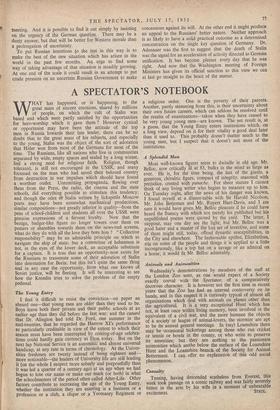The Young Entry I find it difficult to resist the
conviction—on paper an absurd one—that young men are older than they used to be. Boys leave both their private and their public schools at an earlier age than they did before the last war; and the canard that Dr. Alington had told Dr. Ford, one summer in the mid-twenties, that he regarded the Harrow XI's' performance as particularly creditable in view of the extent to which their season must have been interrupted by coming-of-age celebra- tions could hardly gain currency at Eton today. But on the next lap National Service is an automatic and almost universal handicap, at any rate in terms of chronology. At the Univer- sities freshmen are twenty instead of being eighteen and— more noticeable—the leaders of University life are still leading it (on the whole I suspect more soberly and purposefully than it was led a quarter of a century ago) at an age when we had begun to lose our name or make our mark (or both) in what the schoolmasters of the period often called After-Life. Other factors contribute to increasing the age of the Young Entry, whether the institution they are entering is a business or a profession or a club, a clique or a Yeomanry Regiment or a religious order. One is the poverty of their parents. Another, partly stemming from this, is their uncertainty about their own future careers, which can seldom be resolved until the results of examinations—taken when they have ceased to be very young young men—are known. The net result is, at a guess, that the Young Entry enters institutions which, on a long view, depend on it for their vitality a good deal later than it used to. This probably doesn't' matter much to the young men, but I suspect that it doesn't suit most of the institutions.


























 Previous page
Previous page